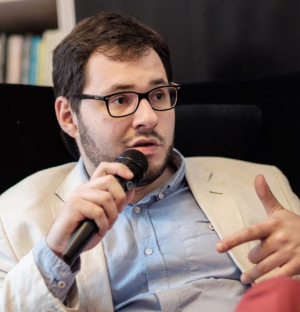
Profesor Uniwersytetu Jagiellońskiego, dr hab. psychologii, dr filozofii, kierownik Mathematical Cognition and Learning Lab.
Jego badania dotyczą przede wszystkim psychologii matematyki, czyli poznawczego przetwarzania liczb i struktur geometrycznych, oraz pojęciowych i metodologicznych zagadnień (neuro)kognitywistyki. Aktualnie kieruje grantem „Artefakty poznawcze w różnych skalach czasowych: Podejście integracyjne” (Narodowe Centrum Nauki, Opus, 2022 –2025). Laureat Nagrody Naukowej Polityki, Stypendium „Start” Fundacji na Rzecz Nauki Polskiej oraz Stypendium Ministra Nauki i Szkolnictwa Wyższego dla wybitnych młodych naukowców. Angażuje się w popularyzację nauki i tłumaczenia książek.
Associate Professor at the Jagiellonian University, Dr. habil. in psychology, Ph.D. in philosophy, a head of the Mathematical Cognition and Learning Lab. His research focuses mainly on the psychology of mathematics, i.e., cognitive processing of numbers and geometric structures, as well as conceptual and methodological issues in cognitive (neuro)science. Currently he is a PI of a research grant “Cognitive artifacts on various time scales: An integrative approach (National Science Centre, Poland, Opus programme, 2022–2025). Mateusz received a number of awards and scholarships, including the “Start” Scholarship of the Foundation for Polish Science, the Scientific Prize of “Polityka” (one of the most read Polish weeklies), and Scholarship of the Minister of Science and Higher Education for outstanding young scientists. He is involved in popularizing science and book translations.
Kontakt: mateusz.hohol@uj.edu.pl
ORCID: 0000-0003-0422-5488
Znajdź na:
- Google Scholar
- ResearchGate
- Osobista strona internetowa / personal website: hohol.pl
- Mathematical Cognition and Learning Lab
- Eksperymentalna psychologia poznawcza: mechanizmy poznania matematycznego i przestrzennego, w szczególności: przetwarzanie wielkości, asocjacje przestrzenno-numeryczne, ucieleśnienie matematyki, poznawcze podstawy geometrii.
- Filozofia (neuro)kognitywistyki: pojęciowe i metodologiczne problemy nauk o poznaniu, w szczególności: szerokie poznanie, artefakty poznawcze, wyjaśnianie mechanistyczne, integracja i unifikacja interdyscyplinarnych badań nad mózgiem i poznaniem.
- Experimental cognitive psychology: mechanisms of mathematical and spatial cognition , in particular: magnitude processing, spatial-numerical associations, embodiment of mathematics, cognitive foundations of geometry.
- Philosophy of cognitive (neuro)science: conceptual and methodological issues in cognitive science, in particular: wide cognition, cognitive artifacts, mechanistic explanation, integration and unification of interdisciplinary research on brain and cognition.
Książki / Books:
- Hohol, M. (2020). Foundations of geometric cognition. London–New York: Routledge
- Brożek, B., Heller, M., Hohol, M. (Eds.). (2017). The concept of explanation. Kraków: Copernicus Center Press.
- Brożek, B., Hohol, M. (2014). Umysł matematyczny. Kraków: Copernicus Center Press.
- Stelmach, J., Brożek, B., Hohol, M. (Eds.). (2013). The many faces of normativity. Kraków: Copernicus Center Press.
- Hohol, M. (2013). Wyjaśnić umysł. Struktura teorii neurokognitywnych. Kraków: Copernicus Center Press.
Artykuły / peer-reviewed papers:
- Baran, B., Krzyżowski, M., Radai, Z., Francikowski, J., & Hohol, M. (2022). Geometry-based navigation in the dark: Layout symmetry facilitates spatial learning in the house cricket, Acheta domesticus, in the absence of visual cues. Animal Cognition. https://doi.org/10.1101/2019.12.28.886655
- Wołoszyn, K., Hohol, M., Kuniecki, M., & Winkielman, P. (2022). Restricting movements of lower face leaves recognition of emotional vocalizations intact but introduces a valence positivity bias. Scientific Reports, 12(16101), 1–10. https://doi.org/10.1038/s41598-022-18888-0
- Hohol, M., Wołoszyn, K., & Cipora, K. (2022). No fingers, no SNARC? Neither the finger counting starting hand, nor its stability robustly affect the SNARC effect. Acta Psychologica, 230, 103765. https://doi.org/10.1016/j.actpsy.2022.103765
- Hohol, M., Wołoszyn K., Brożek, B. (2021). Making cognitive niches explicit: On the importance of external cognitive representations in accounting for cumulative culture. Frontiers in Integrative Neuroscience, 15(734930). https://doi.org/10.3389/fnint.2021.734930
- Miłkowski, M., Hohol, M. (2021). Explanations in cognitive science: Unication versus pluralism. Synthese, 199(Suppl. 1), S1–S17. https://doi.org/10.1007/s11229-020-02777-y
- Hohol, M., Willmes, K., Nęcka, E., Brożek, B., Nuerk, H.-C., Cipora, K. (2020). Professional mathematicians do not differ from others in the symbolic numerical distance and size effects. Scientific Reports, 10(11531). https://doi.org/10.1038/s41598-020-68202-z
- Miłkowski, M., Hohol, M. Nowakowski, P. (2019). Mechanisms in psychology: The road towards unity? Theory & Psychology, 29(5), 567–578. https://doi.org/10.1177/0959354319875218
- Hohol, M., Miłkowski, M. (2019). Cognitive artifacts for geometric reasoning. Foundations of Science, 24(4), 657–680. https://doi.org/10.1007/s10699-019-09603-w
- Miłkowski, M., Hensel, W.M., Hohol, M. (2018). Replicability or reproducibility? On the replication crisis in computational neuroscience and sharing only relevant detail. Journal of Computational Neuroscience, 45(3), 163–172. https://doi.org/10.1007/s10827-018-0702-z
- Hohol, M., Wołoszyn, K., Nuerk, H.-C., Cipora, K. (2018). A large-scale survey on finger counting routines, their temporal stability and flexibility in educated adults. PeerJ, 6(e5878). https://doi.org/10.7717/peerj.5878
- Miłkowski, M., Clowes, R.W., Rucińska, Z., Przegalińska, A., Zawidzki, T., Gies, A., Krueger, J., McGann, M., Afeltowicz, Ł., Wachowski, W.M., Stjernberg, F., Loughlin, V., Hohol, M. (2018). From wide cognition to mechanisms: A silent revolution. Frontiers in Psychology, 9(2393) https://doi.org/10.3389/fpsyg.2018.02393
- Hohol, M., Baran, B., Krzyżowski, M., Francikowski, J. (2017). Does spatial navigation have a blind-spot? Visiocentrism is not enough to explain the navigational behavior comprehensively. Frontiers in Behavioral Neuroscience, 11(154). https://doi.org/10.3389/fnbeh.2017.00154
- Hohol, M., Cipora, K., Willmes, K., Nuerk, H.-C. (2017). Bringing back the balance: Domain-general processes are also important in numerical cognition. Frontiers in Psychology, 8(499). http://doi.org/10.3389/fpsyg.2017.00499
- Cipora, K., Hohol, M., Nuerk, H.-C., Willmes, K., Brożek, B., Kucharzyk, B., Nęcka, E. (2016) Professional mathematicians differ from controls in their spatial-numerical associations, Psychological Research, 80, 710–726. http://doi.org/10.1007/s00426-015-0677-6
